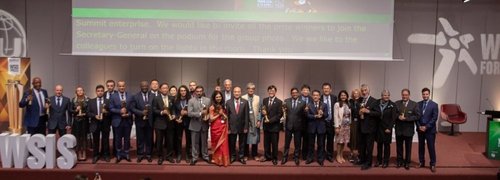The e-science prize of World Summit on Information Society (WSIS) was bagged by Iran National Research and Education Network (Iran NERN).
Eighteen WSIS prize winners were announced during the five-day WSIS Forum 2019 that ended on Friday in Geneva, website of the UN specialized telecom agency, the International Telecommunication Union (ITU) reported.
WSIS is co-organized by four UN Agencies, namely the ITU, UN Educational Scientific and Cultural Organization, UN Conference on Trade and Development, and the United Nations Development Program.
ITU website named Iran NERN as one of the components of the Iranian scientific ecosystem adding that it has contributed to the development of e-science and capacity building in Iran’s scientific growth.
Locally called by its Persian abbreviation SHOA, Iran NERN is a public-private partnership (PPP) project between the private sector, academia and government.
SHOA is a specialized Internet service provider dedicated to supporting the needs of the R&D communities in the country. Led by a private firm, Seemorgh System, the project is backed by Iran’s Information Technology Organization (ITO) and the Iranian Research Organization for Science and Technology (IROST).
Similar networks are used in other countries and usually provide academic bodies and research institution with high-speed communication services.
Diar Geographical Information System
In addition to Iran NERN, another ICT-related project from Iran — Diar Geographical Information System —was among the 90 initiatives from around the globe recognized for implementing the WSIS Action Lines, which competed for this year’s WSIS prizes.
Introduced in 2005, the action line, which is also dubbed the Tunis Agenda for the Information Society, calls for creating an Internet Governance Forum, a lightweight, multi-stakeholder governance structure for the Internet.
Developed by the ICT Ministry, Diar has been designed to capture, analyze, and present the status and coverage of ICT services in different locations in a visual and map-based format.
ICT Minister Mohammad Javad Azari Jahromi participated in the forum and met with ITU Secretary-General Houlin Zhao and World Intellectual Property Organization director, Francis Gurry.
Accessibility Day
One of the main topics discussed during the meetings was the application of assistive technologies in offering services to people with disabilities.
According to the World Health Organization, persons with disabilities represent 15% of the world’s population. This amounts to nearly one billion people who are more likely to experience barriers to education, poor health outcomes, lower levels of employment and higher poverty rates.
At the WSIS, technology stakeholders discussed how ICTs can assist the disabled and do not further widen the socioeconomic gaps, they are struggling with.
Several solutions were presented at the “Accessibility Day” on the opening day of the forum.
“Over a billion people live with disabilities. And 90% in developing countries do not have access to the technologies they need,” warned Alex Young, from the UK’s department for international development.
He discussed how assistive technologies in developing countries, including digital technologies, need to be prioritized if the international community is to achieve the Sustainable Development Goals set by the UN.
He described how a focus on innovation, user-centered design, open market access, and partnerships are making progress.
“Accessibility is not a barrier to innovation,” noted Akber Gardezi, from the Inter Islamic Network on Information Technology, who works to promote inclusive innovation policies in Pakistan and throughout the Arab world.
Furthermore, an interactive hands-on workshop, “Digital technologies and accessibility: from rhetoric to reality,” led by Tim Unwin, the UNESCO Chair in ICT4D (Information and Communications Technologies for Development), produced a mind map for collective actions to ensure the ICTs are accessible to all.


